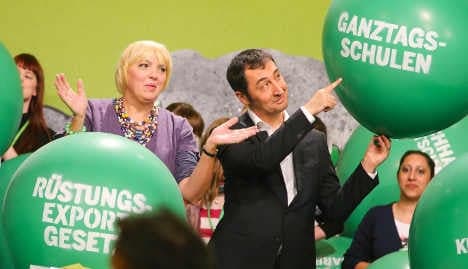SPD and Greens unite to battle election

Germany's Greens pledged to fight a joint battle with the centre-left Social Democrats against conservative Chancellor Angela Merkel in elections five months away as it wrapped up a three-day party congress Sunday.
The Greens, who grew out of the 1970s peace, anti-nuclear and environmental movements, are now the country's third biggest political force and are hoping to return to national government with the campaign slogan "Germany is
renewable."
At their Berlin party congress the Greens, who score around 15 percent in polls, committed to stick with the Social Democrats as alliance partners despite the weakness of that party's would-be chancellor Peer Steinbrück, whose campaign has been hobbled by a series of missteps.
The fact that a "red-green" alliance is now trailing Merkel's coalition government in polls has raised talk about a once-taboo idea - that the Greens could turn to Merkel's conservative party, if both sides needed it to form a coalition government after the September 22 poll.
But the Green state premier of Baden-Württemberg, Winfried Kretschmann,
confidently declared that red-green state governments were "the vanguard" for
the next federal government, telling delegates: "We can win these elections
because the citizens can trust us."
One of the two top Greens candidates, Katrin Göring-Eckardt, a Christian church leader who like Merkel hails from the former East Germany, told the meeting that the Greens did not represent a narrow interest group but were "the lobby for the real life out there."
The previous day, Sigmar Gabriel became the first Social Democratic Party (SPD) chief to address a Greens meeting, rallying members for a joint fight against Merkel and her eurozone crisis management which Gabriel labelled a "policy that has no tomorrow."
The second in the Greens duo of top candidates, Jürgen Trittin, argued that the party already governed with its partners in states that covered 50 million of Germany's roughly 80 million people, and that it hoped to "convince the other 30 million."
Speaking to the Handelsblatt daily, Trittin quipped that one could now ride a bicycle across much of the country "without the risk of hitting a Christian
Democratic state premier along the way."
As the party agreed on its campaign manifesto in Berlin, it pledged it would increase taxes on the rich and speed up Germany's transition from nuclear power to renewable energies - a long-time Greens demand adopted by Merkel after the 2011 Fukushima disaster.
The party also demanded a minimum wage of at least €8.50 ($11) an hour, pledged to fight for a more democratic Europe, and said it would stop German weapons exports to countries with questionable human rights records, citing sales of armoured vehicles to Saudi Arabia and Qatar.
AFP/The Local/kkf
Comments
See Also
The Greens, who grew out of the 1970s peace, anti-nuclear and environmental movements, are now the country's third biggest political force and are hoping to return to national government with the campaign slogan "Germany is
renewable."
At their Berlin party congress the Greens, who score around 15 percent in polls, committed to stick with the Social Democrats as alliance partners despite the weakness of that party's would-be chancellor Peer Steinbrück, whose campaign has been hobbled by a series of missteps.
The fact that a "red-green" alliance is now trailing Merkel's coalition government in polls has raised talk about a once-taboo idea - that the Greens could turn to Merkel's conservative party, if both sides needed it to form a coalition government after the September 22 poll.
But the Green state premier of Baden-Württemberg, Winfried Kretschmann,
confidently declared that red-green state governments were "the vanguard" for
the next federal government, telling delegates: "We can win these elections
because the citizens can trust us."
One of the two top Greens candidates, Katrin Göring-Eckardt, a Christian church leader who like Merkel hails from the former East Germany, told the meeting that the Greens did not represent a narrow interest group but were "the lobby for the real life out there."
The previous day, Sigmar Gabriel became the first Social Democratic Party (SPD) chief to address a Greens meeting, rallying members for a joint fight against Merkel and her eurozone crisis management which Gabriel labelled a "policy that has no tomorrow."
The second in the Greens duo of top candidates, Jürgen Trittin, argued that the party already governed with its partners in states that covered 50 million of Germany's roughly 80 million people, and that it hoped to "convince the other 30 million."
Speaking to the Handelsblatt daily, Trittin quipped that one could now ride a bicycle across much of the country "without the risk of hitting a Christian
Democratic state premier along the way."
As the party agreed on its campaign manifesto in Berlin, it pledged it would increase taxes on the rich and speed up Germany's transition from nuclear power to renewable energies - a long-time Greens demand adopted by Merkel after the 2011 Fukushima disaster.
The party also demanded a minimum wage of at least €8.50 ($11) an hour, pledged to fight for a more democratic Europe, and said it would stop German weapons exports to countries with questionable human rights records, citing sales of armoured vehicles to Saudi Arabia and Qatar.
AFP/The Local/kkf
Join the conversation in our comments section below. Share your own views and experience and if you have a question or suggestion for our journalists then email us at [email protected].
Please keep comments civil, constructive and on topic – and make sure to read our terms of use before getting involved.
Please log in here to leave a comment.